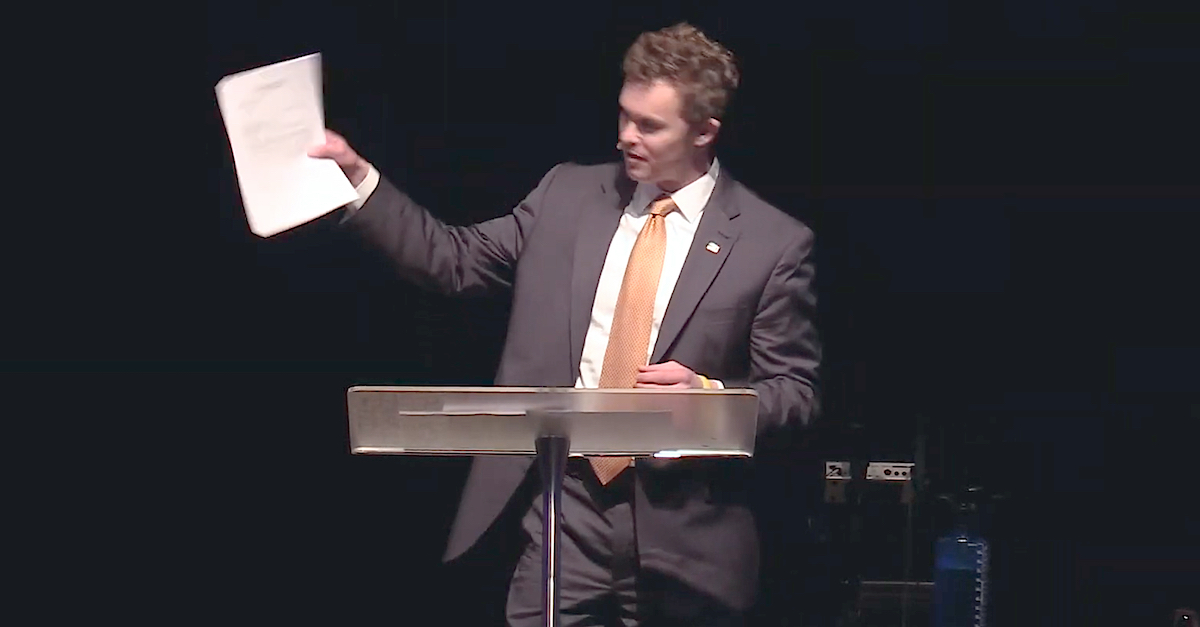
Attorney Paul M. Davis appears in a screengrab taken from a social media feed obtained by television station KDFW-TV.
A Texas lawyer who was present near the U.S. Capitol on Jan. 6th has dropped a 2020 election-related lawsuit against House Speaker Nancy Pelosi, Senate Minority Leader Mitch McConnell, Senate Majority Leader Chuck Schumer, and a myriad of other government and business actors.
“[T]he era of rule by the wealthy elites and rule of their corrupt two-party system is now over,” the Feb. 22nd lawsuit proclaimed. The case alleged that a “well-funded cabal” of “both state and federal officials,” including “Democrats” and “Republicans,” acted in a “conspiracy” along with various “persons in the news media, social media, and technology industry” and other random “high net worth individuals” to “willfully deprive the American People of their ‘most precious’ and fundamental right: the right to the ‘Republican Form of Government’ guaranteed by Article IV, Section 4 (the ‘Guarantee Clause’) of the Constitution of the United States and other fundamental civil rights.”
The lawsuit took square aim not at the outcome of the presidential election — but rather at the congressional election which resulted in the 117th congress which in turn affirmed Joe Biden’s electoral college victory.
“Congress had no authority to confirm Mr. Biden and Ms. Harris as ‘President-elect’ and ‘Vice President-elect,'” the lawsuit argued. “This is because the 117th Congress is itself illegitimate as the fruit of an unconstitutional 2020 congressional election process.”
Other named defendants included Facebook CEO Mark Zuckerberg, Georgia Secretary of State Brad Raffensperger, the entire 117th Congress, all the governors of all 50 states, all other secretaries of state, the Democratic Congressional Campaign Committee, the Democratic Senate Campaign Committee, and the Republican National Committee — among others.

Attorney Paul M. Davis is seen giving a speech in an image from a Facebook video screengrab.
The lawsuit, styled as Bravo v. Pelosi, sought an amazing list of remedies — including a new election and the complete remaking of two of the three branches of the federal government. Here is the plaintiffs’ initial list of demands:
a. Permanent injunctive relief in the form of a new federal election for Congress;
b. After the new Congress is seated, a new process to fill the vacancies of the offices of President and Vice President pursuant to Title 3, Chapter 1 of the United States Code, which were never lawfully filled;
c. Permanent injunctive relief forever restraining Defendants from ever holding public office or participating in any way in an election campaign to public office other than exercising their own right to vote;
d. Permanent injunctive relief forever restraining Defendants from violating Plaintiffs constitutional rights described herein,
e. General Damages in an amount to be determined at the time of trial;
f. Punitive Damages in an amount to be determined at the time of trial;
g. Reasonable attorneys fees’ and costs of suit;
h. Prejudgment and postjudgment interest.
Lead plaintiff Jeremy Bravo “had a change of heart and insisted on being dropped from the case immediately,” later court filings indicated. An amended complaint bore the name of Jennilyn Salinas as lead plaintiff, but Bravo’s name remains on the case caption in PACER, an electronic docketing system used by all federal courts.
Attorney Paul M. Davis, who was behind the litigation, also filed a similar case in late January. That case, Latinos for Trump v. Sessions, attempted to assert that Biden was not a legitimate president and that a federal judge could assemble a collection of “stewards” from the cabinet of former president Donald Trump to call the shots within the U.S. government pending an election the plaintiffs considered legitimate. Biden, under this lawsuit, should have been left on the proverbial sidelines as little more than a president in name only; the lawsuit declared that “Gondor” (America) would simply have “no King” (president). It also sought a temporary restraining order to ban “each illegitimate member” of Congress from undertaking legislative activities — including counting electoral votes to install Biden as president. As Law&Crime previously noted, one commentator described the Sessions lawsuit as a blatant attempt “to invent an entirely new system of government” not contemplated anywhere in the Constitution. Another called it the “single most insane request” ever presented to a judge.
A judge indicated he was not enthusiastic about the Sessions case. Davis filed a motion to withdraw as counsel, and many of the plaintiffs agreed to voluntarily dismiss the action. No movement has occurred in the Sessions docket since May 27th.
Just this week, Davis agreed to voluntarily dismiss Bravo v. Pelosi.
“Despite best efforts, Plaintiffs have not been able to muster the resources necessary to continue to litigate this lawsuit,” an aptly named Notice of Voluntary Dismissal indicates.
Several of the Bravo defendants argued that the plaintiffs lacked standing, that Eleventh Amendment immunity applied, that the forum federal court in Texas lacked personal jurisdiction over them, and that the plaintiffs’ claim otherwise failed as a matter of law. The dismissal notice notes that those defendants who had responded to the lawsuit “already stipulated to dismissal,” but many of the defendants never filed an answer. Federal court rules allow the plaintiffs to rubbish the litigation accordingly without hearing from the defendants, the document states.
“Accordingly, Plaintiffs hereby file this notice of dismissal of this action and request that the clerk enter a dismissal of this action in its entirety,” the document continues.
It goes on with several parting paragraphs:
Plaintiffs and counsel wish to thank the Court, clerks, and staff for their work related to this case and bearing with Plaintiffs in their attempt to fight back against the corruption that is so evident in American government and politics today and to hold the Defendants accountable for the despicable acts described in the complaint.
As a final note, Plaintiffs and counsel are encouraged to see other lawsuits being filed around the country to fight for election integrity and against government tyranny. Plaintiffs and counsel have no regrets for doing their best to fight tyranny with this lawsuit and will now devote their modest means to assisting in these other efforts around the country to restore the republic envisioned by our founding fathers in the Constitution and to protect the individual God-given “unalienable rights” as set forth in the Declaration of Independence. May God bless these United States of America, deliver us from evil, and bring us back to our founding principles of equality before God, liberty, and justice for all.
In response to an email request for comment from Law&Crime, Davis said that his lawsuit “suffered some pretty severe setbacks from a bad actor in our own camp from which it was difficult to recover in the short time span needed.” Davis pointed to a June 29th court document and attached exhibit to further articulate his dilemma. Those documents say, in part:
Unfortunately, Plaintiffs have suffered severe setbacks in this case over the last few weeks as the result of a bad actor and saboteur in their own camp. Plaintiffs and counsel were assured many times over that financial resources and a cadre of co-counsel and legal staff were on the verge of being provided to give Plaintiffs the ability to litigate their claims against the vast array of Defendants in this case. Unfortunately, these assurances turned out to be empty promises.
[ . . . ]
This individual has now parted ways with Plaintiffs’ legal team after being confronted on various suspected deceptions and is now refusing to turn over evidence that was in his possession and that supports many of Plaintiffs’ claims in their pleadings.
Davis told Law&Crime that another team was litigating similar issues — and that “gave us encouragement that the objectives we wanted to achieve with our lawsuit are being addressed by organizations with better resources than ours.”
He was “encouraging our supporters to get behind those efforts instead,” his email indicated.
Read the original complaint below:
Read the amended complaint here:
Read the dismissal notice here:
[Editor’s note: this piece has been updated to include comments about the conclusion of the case from attorney Paul Davis.]